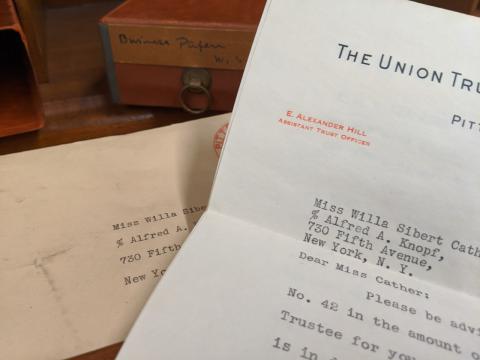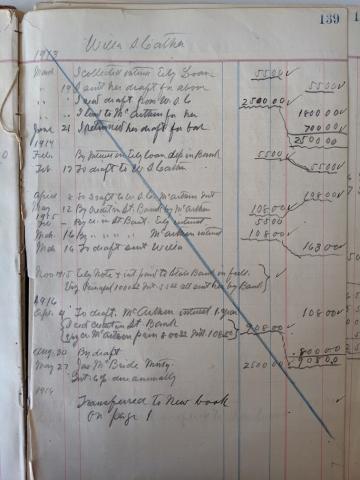

Annotations from the Archive: Business Papers
When the prohibition on publication of Willa Cather’s letters expired, a wealth of new Willa Cather biographical material could be shared with Cather’s readers—and in her own words! One aspect of Cather’s life has made an intriguing study in recent years—her financial interests. Like her brothers and father, Willa Cather invested and managed multiple streams of income, designed to both support herself during leaner times and to avoid “the awful income tax.”
Cather frequently confides in her brother Roscoe at the height of her success. “In these days,” she writes in 1940, “any kind of success brings its own problems.” She goes on to describe, in this letter and in others, a series of small investments, charitable gifts, and income earned from her writing, both foreign and domestic, that, when combined, result in a complicated accounting situation.
Her investments, however, began much earlier. Archival materials allow us to piece together at least a few of her earlier investments. One particular letter from Cather to her father in 1913 details money that she has sent to him to use as loans to Mr. Topham—perhaps Joseph Topham—and Mr. McArthur, who is likely Arthur McArthur, who apprenticed and then took over the ownership of the Webster County Argus. “Thank you for the interest check,” Cather writes. “I am glad the loan to Mr. MacArthur went through satisfactorily, and I hope you will be able to place the other $700. If you can not place it before July 1st, perhaps you had better send it back to me, as the savings bank will pay me 4 percent on it.” Papers belonging to Charles Cather, re-acquired as part of the WCPM collection transfer in 2019, include a number of farm-related papers that detail several years of farm income, loans made, and other business concerns. Charles Cather’s ledger records the exact loan mentioned in this letter, but more importantly, the ledger also shows us that her investment in farm loans began several years before. This single ledger contains loans made between 1907 and 1913.
In the 1920s and 1930s, Cather invested even more. A recent gift to our collection from the estate of Pittsburgh Cather scholar Jeanne Shaffer contained a charming cardboard filing box, labeled “Business Papers - W.S.C.” in Willa Cather’s handwriting. Within it were two documents detailing value and actions taken on behalf of Trust #2275, Union Trust Company, addressed to Willa Cather in care of her publisher, Alfred A. Knopf. Cather was unhappy with the performance of this investment and wrote to Roscoe several times about it, finally asking in 1939, “Can you, as a banker, tell me any way to get my money out of this trust?”
At the same time, Cather continued to invest in farm loans back home in Webster County. A rancorous transaction with her brother-in-law, J.W. Auld, is documented in letters from Cather to Willard Crowell, a friend of Charles Cather who became Willa Cather’s farm manager:
"Why Mr. Auld or any other banker should have loaned about $8,000 ... on that property is beyond my comprehension. But since he had made such a loan, he [Mr. Auld] made good his loss by taking $8,000 which I had sent him, to invest for me, and turning [that] mortgage over to me in exchange. ... I had always thought that farm was the worst looking piece of farm land between Red Cloud and Hastings.”
Cather was particularly dismayed to learn the farms she owned in Webster County were also in arrears on property taxes. Though her investments were clearly meant to earn, her financial records and letters also document many, many small gifts to friends and neighbors in Webster County, particularly during war years and the depths of the Great Depression. She seems determined that her money be spent where it has most impact. “Each year I have sent a considerable sum of money to old friends and neighbours in Nebraska, to help them through these hard times. I had much rather spend money in this way than in paying back taxes.”
However, it also is clear in Cather’s letters to Crowell, like those written to her brother Roscoe, that the time and attention needed for these investments was a drain on her creativity. In one letter she tells Crowell: “I repeat that if I were twenty years younger I would certainly hold on to the farms, for I have not lost faith in that country. But as the facts actually are, there are two considerations of chief importance in my situation: 1) Not to send good money after bad, and 2) To give all my time and strength to my own profession and to the many demands which it makes upon me.”
To learn more or to conduct research into Cather’s business affairs, make plans to visit! The archives at the National Willa Cather Center are open Wednesday through Friday, 9:00 a.m. to 4:00 p.m., or by appointment. Please contact archivist Tracy Tucker at ttucker@willacather.org to plan a research visit. To make the most of your time in Nebraska, you should also visit the Cather collections at the University of Nebraska-Lincoln and History Nebraska; the rich archival collections held in Cather’s home state are critical to understanding Cather’s life and career.
Sources:
- Cather Family Library at the National Willa Cather Center
- The Willard Crowell Collection at the National Willa Cather Center
- The Philip & Helen Cather Southwick Collection at the University of Nebraska-Lincoln
- The Roscoe & Meta Cather Collection at the University of Nebraska-Lincoln
- The Betty Kort Collection at the National Willa Cather Center
- The Southwick Paper Collection at the National Willa Cather Center
- The Jeanne Shaffer Collection at the National Willa Cather Center
